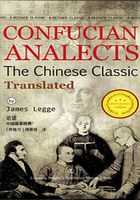
CHAPTER 21
1. Someone addressed Confucius, saying, "Sir, why are you not engaged in the government?"
19. HOW A PRINCE BY THE RIGHT EMPLOYMENT OF THIS OFFICERS MAY SECURE THE REAL SUBMISSION OF HIS SUBJUECTS. Gae was the honorary epithet of 蒋, duke of Loo (B.C. 494-367). Conf. died in his 16th year. Accord. To the laws for posthumous titles, 哀denotes 'the respectful and benevolent, early cut off'. 哀公= 'The to-be-lamented duke'. 错, up.3d tone,=置, 'to set aside'. 诸 is partly euphonious, but also indicates the plural. 孔子对曰, 'The philosopher K'ung replied'. Here, for the first time, the sage is called by his surname, and, 对 is used, as indicating the reply of an inferior to a superior.
Greg Mark for the record of infringement of copyright just in case.
20. EXAMPLE IN SUPERIORS IS MORE POWERFUL THAN FORCE. K'ang, 'easy and pleasant, people-soother', was the honorary epithet of Ke-sun Fei(肥), the head of one of the three great families of Loo; see ch. 5. His idea is seen in 使, 'to cause', the power of force; that of Conf. appears in 则, 'then', the power of influence. In 以劝, 以is said to=与, 'together with', 'mutually'. 劝, 'to advise', 'to teach', has also in the Dict. the meaning– 'to rejoice to follow', which is its force here, 为善, 'the practice of goodness', being understood.
21. CONFUCIUS' EXPLANATION OF HIS NOT BEING IN ANY OFFICE. 1. 或谓孔子,—The surname indic. that the questioner was not a disciple. Conf. had his reason for not being in office at the time, but it was not expedient to tell. He replied therefore, as in par.2.2. See Shoo-king xxii.1. But the text is neither correctly applied nor exactly quoted. The old inter. read in one sentence 孝乎惟孝, 'O filial piety! Nothing but filial piety!' Choo He, however, pause at乎, and commences rightly the quotation with 惟孝. A western may think that the philosopher might have made a happier evasion. 奚其为为政, the 1st 为=以为, and 其 referring to the thought in the man's question, that office was necessary to one's being in government.

2. The Master said, "What does the Shoo-king say of filial piety?—'You are final, you discharge your brotherly duties. These qualities are displayed in government.' This then also constitutes the exercise of government. Why must there be THAT to make one be in the government?"